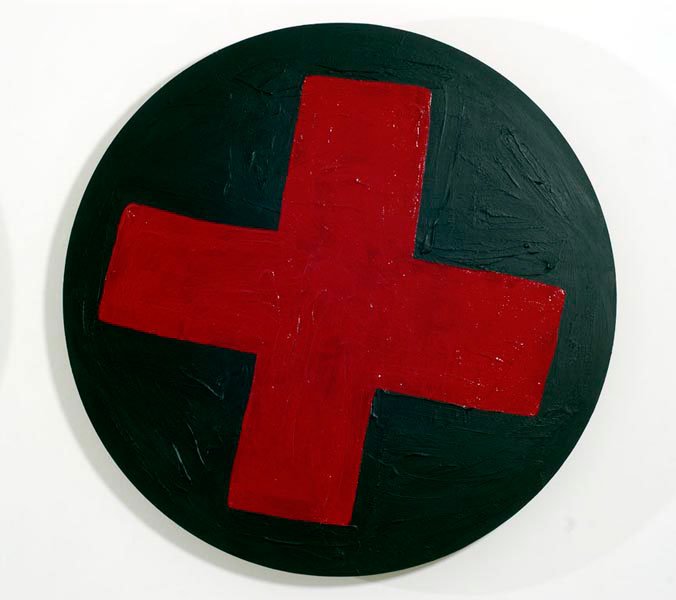Franko B: Bloody Charming
James Westcott, NY Arts Magazine (2005)
Franko B was born in Milan and ran away to London in 1979. He lived on the streets for a while and eventually got a job washing dishes in an Italian restaurant. When Franko went to art school a few years later in Chelsea, he was told to stick to oil painting. His answer: "Oh fuck off." Now, Franko B makes performances, paintings, and photographs–often all three at once. With gold teeth, multiple tattoos ("Blinded by love" written on each hand, red crosses everywhere), and a gravelly voice, Franko B cuts an intimidating figure. But he has a beguiling sweetness and vulnerability that is made eloquent in his generous, touching work: the blood spatters aren’t evidence of violence–they come straight from the heart. I sat down with Franko in his London flat to talk about his "return" to painting with a show in Trieste–even though he insists he never left painting–and about an upcoming re-performance of his blood-letting work "I Miss You."
James Westcott: What makes you want to do a painting rather than a performance?
Franko B: When I introduce myself to people, I say "I’m Franko B, I’m a visual artist who happens to perform." I think I’ve always wanted to make paintings or sculptures; I’ve just used different strategies or different mediums. In the early days I never saw myself as a performance artist at all, only as a vehicle. But suddenly I being called a performance artist. Actually I don’t like this separation of things.
JW: Is performance the most direct route to what you want to say?
FB: When I think of performance I don’t think of story-telling, I think of image-making. As I say, I became a performance artist by accident. Somebody harassed me to perform in a club and I actually found it quite liberating. I lost my er… inhibity. Eventually I was performing at the ICA. Then I developed. I had to pay my rent. The point for me is that I switch. I think there’s a history of people like that, from Joseph Beuys to Gina Pane. Art is art. I think language is the most important thing. I don’t think it matters what you use; if it’s literature, film, installation, or painting, or whatever. If it’s good–if it touches me–I’ll remember it.
JW: What do you think about the kind of artist whose sheer force of personality drives their art, and in a way they’re always performing? Even if what they produce isn’t performance, do you think they could be called performance artists?
FB: I don’t really know if you can say that. We all perform–essentially, we have to perform. One thing you have to be careful of: I think there’s performance and there’s performative. A very basic example: I always say that life is performative, but I would never say that life is a performance. For me that would be kind of misplaced. But what is performative? This is a very good question. It’s when things have consequence, when people perform a role, or they’re going somewhere. That’s performative. It’s not something that you switch on or off, whereas performance you do.
JW: Like a plumber fixes toilets, and that’s the service that he performs, but he’s not a performance artist.
FB: Right, but you could say that it’s performative. It’s to do with intention. I think we all perform, and you can say that some artists do it more because of their personality or their charisma.
JW: Tell me about what you’re doing in Trieste.
FB: It’s only a painting show. The show is called Long Live Romance. People keep saying: "painting is dead," "romance is dead." It’s bollocks. I mean, what makes us tick? We have affairs with things. We have love stories, whether it’s work or an issue, with something, or with a person.
JW: Why are all the paintings circular?
FB: It was an experiment. I got 30 made. It was the first time I worked with painting since my Chelsea days 17 years ago. I found the rectangle different. I never left painting but physically I’m back to painting. What I’m saying is that I don’t separate my practice. Some people say I’m a performance artist, some say I’m a photographer, some say I’m a painter.
JW: What do you have planned after Trieste?
FB: I’m performing in Brussels, where I will be making a painting with my blood. The piece is called "I Miss You." The last time I did it was at Tate Modern. Now I’m doing it at the Palace of Beautiful Art. I don’t know the French. I’m doing this kind of action where I’m painting as I’m performing. Then my intention with the canvass is to make a slogan in life size letters that will say: "I miss you."
JW: When you cut yourself…
FB: I don’t cut myself. It’s a blood-letting exercise. It’s the same procedure as when you give blood.
JW: It sounds like you get annoyed when people say that it’s cutting.
FB: People say that a lot. Even the festival [in Brussels] says it. I don’t even bother any more. You can’t control it. You have to have a healthy attitude. Once you make a work you don’t own it anymore. Whether you like it or not, the work shows things about yourself that you were not aware of. So if you think: "I want to do this," then you’re just going to do the opposite. The way they described me was "Franko B’s battered body." I don’t think my body has been battered. Certainly if it has been battered it’s not then, when it’s bleeding.
JW: How does it feel when you see your own blood?
FB: While I’m bleeding I don’t really see it. If I look at it, it’s just to make sure, because I don’t have a sense if I’m bleeding. I have to keep very cool. Inside I might be very emotional, but I don’t show it. It’s performance. Nothing else. But then of course there’s a lot of baggage.
I’m not interested in self-harm. I don’t need to pinch myself to feel I’m alive. For me it’s about making images and talking about things. For me performance is about being honest, being totally naked.
JW: You cover yourself in paint though.
FB: Because of the tattoos. They would complicate the images.
JW: Some people will think it’s very brutal and other people will not. It’s clinical, in a way.
FB: Or moving or touching, or they cry. A lot of people cry. Why they cry I don’t know. I’m not going to psychoanalyse them. But what I think is true is that it’s more to do with them than it is to do with me.
JW: You’re making them vulnerable. They’re not crying out of pity for you.
FB: I think it’s more to do with allowing them to show their feelings or connect with something that’s deeper. What they see is not me any more. They see a symbol. A representation of life. Of loss, their loss. In a way what they see is not Franko B, but human being.
JW: This is why I like performance, because it’s ethical in a way that a lot of art isn’t.
FB: That’s a big one. What is ethical for you might not be for me. But I know what you’re saying in a way. I used to say that I use my body and it’s the most democratic way of working because the body, it’s my body; the blood, it’s my blood. I can’t be accused of exploiting anybody. In a way you can say this is more ethical. I don’t think I exploit myself.
JW: Maybe performance is ethical because it’s based on the idea that a huge radical change can happen at once. But visual art isn’t so ethical any more, and you can say things like "The twin towers on fire was beautiful," and it’s completely divorced from ethics.
FB: It was performative but it wasn’t performance. I think you can make it up as you go along. Do you know what I mean? You have to be careful.
related works:
-

• Circle Paintings
acrylic on wood (2004)
-

• I Miss You
performance (1999-2005)
